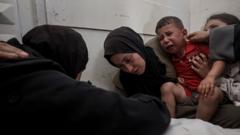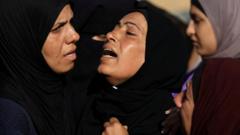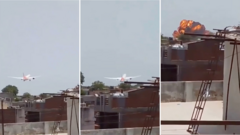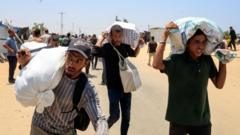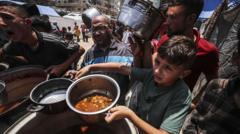After several harrowing days adrift on an oil platform, 32 migrants were successfully rescued by the NGO Sea Watch. The individuals had been stranded after their boat capsized, and they faced critical conditions during their time trapped at sea. With one reported fatality, the urgency of the situation raised questions about the lack of intervention from nearby European nations.
Rescue Operation for Migrants Stranded at Sea: A Dire Situation Averted
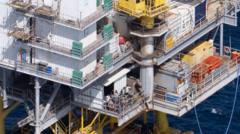
Rescue Operation for Migrants Stranded at Sea: A Dire Situation Averted
A humanitarian crisis unfolds as 32 migrants are rescued from an oil platform in the Mediterranean after days without food or water.
In a tragic incident early this week, a collective of 32 migrants, including women and children, were rescued from a British Gas-managed oil platform in the Mediterranean after enduring several days without basic necessities. The plight of these individuals came to light through the efforts of Mediterranea, a humanitarian charity which highlighted that conditions on the platform were dire. The organization lamented the loss of one migrant, affirming the life-threatening circumstances confronted by the group.
The rescue, conducted by the NGO Sea Watch on Tuesday afternoon, transferred all 32 migrants aboard the Aurora ship. However, uncertainties loomed as no nearby country had yet allocated a safe port for the vessel, leaving the situation unresolved in a climate of political reluctance.
Despite their desperate conditions, including critical food and water shortages and a reported death among their ranks, European nations have so far failed to respond to the emergency that unfolded in international waters, straddling the search and rescue zones of Tunisia and Malta. Radar from NGO monitoring aircraft Seabird initially spotted the empty rubber dinghy linking the migrants to their distress call made to Alarm Phone, an emergency hotline for those in maritime peril.
A video recorded by one of the stranded migrants underscored the severity of their struggle; a young man, in visible distress, conveyed their torment due to hunger and the cold. Speaking in Tigrinya, he detailed their journey from Libya, stating, "We have only little chance [to survive].” Behind him, fellow survivors could be seen battling the bleak conditions amid crashing waves.
In light of the escalating crisis, the UN reported that over 210,000 individuals attempted to cross the Central Mediterranean in 2023, with a staggering 60,000 intercepted and sent back, while nearly 2,000 tragically lost their lives at sea. As the humanitarian narrative continues to unfold, the international community is called upon to take decisive action and avert further tragedies in the Mediterranean.
The rescue, conducted by the NGO Sea Watch on Tuesday afternoon, transferred all 32 migrants aboard the Aurora ship. However, uncertainties loomed as no nearby country had yet allocated a safe port for the vessel, leaving the situation unresolved in a climate of political reluctance.
Despite their desperate conditions, including critical food and water shortages and a reported death among their ranks, European nations have so far failed to respond to the emergency that unfolded in international waters, straddling the search and rescue zones of Tunisia and Malta. Radar from NGO monitoring aircraft Seabird initially spotted the empty rubber dinghy linking the migrants to their distress call made to Alarm Phone, an emergency hotline for those in maritime peril.
A video recorded by one of the stranded migrants underscored the severity of their struggle; a young man, in visible distress, conveyed their torment due to hunger and the cold. Speaking in Tigrinya, he detailed their journey from Libya, stating, "We have only little chance [to survive].” Behind him, fellow survivors could be seen battling the bleak conditions amid crashing waves.
In light of the escalating crisis, the UN reported that over 210,000 individuals attempted to cross the Central Mediterranean in 2023, with a staggering 60,000 intercepted and sent back, while nearly 2,000 tragically lost their lives at sea. As the humanitarian narrative continues to unfold, the international community is called upon to take decisive action and avert further tragedies in the Mediterranean.

